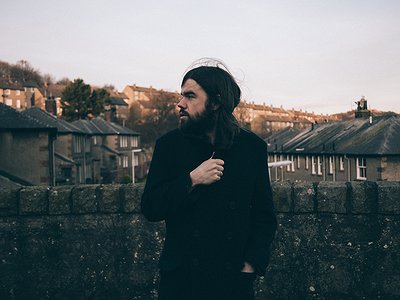Name: Andrew Wasylyk
Occupation: Writer, Producer, Multi-Instrumentalist
Current Release: Themes For Buildings And Places on Tape Club Records
Recommendations: Dave Eggers’, A Heartbreaking Work Of Staggering Genius, and, as an antidote to my tired shtick, Deerhoof’s The Tears And Love Of Music.
If you enjoyed this interview with Andrew Wasylyk, you can find more information on his Facebook page.
When did you start writing/producing music - and what or who were your early passions and influences? What is it about music and/or sound that drew you to it?
I had dabbled with violin and cello around eight years old. Regrettably, neither stuck, as I was fervently preoccupied with kicking a football. It wasn’t until my uncle gave me a guitar (an 80s Fender Stratocaster I still record and tour with) at sixteen that I dared contemplate anything other than listening to music. As I left school in the summer of 1999, I was consuming as much as I could get my hands on; Olivia Tremor Control, DJ Crush, Fairport Convention, Revolver, Cannonball Adderley, Pavement, The Meters. A door had opened and a mysterious universe asked me in, with no going back.
For most artists, originality is first preceded by a phase of learning and, often, emulating others. What was this like for you? How would you describe your own development as an artist and the transition towards your own voice? What is the the relationship between copying, learning and your own creativity?
It was imperative for me to try and understand how and what makes a song tick, and to break an arrangement down to its fundamentals: the groove, the chord changes and voicings, why that ugly-sounding delay is actually quite pleasing etc. If you’re digesting those details then they can be utilised when faced with a blank page.
The search for your own ‘voice’ or ‘sound’ is an endless pursuit. There’s a lifetime of listening out there and no right or wrong. Like in anything, discovery is continual if you want it to be.
What were your main compositional- and production-challenges in the beginning and how have they changed over time?
The crux has probably always been and, hopefully, still remains, ‘the song’ and exposing new paths in and out of it. I’d rather listen to a badly produced, heartbreaking chord change than a half-baked idea propped up with an overzealous plug-in. In other words, I’m still rubbish at editing.
What was your first studio like? How and for what reasons has your set-up evolved over the years and what are currently some of the most important pieces of gear for you?
To begin with I had a Fostex 4-track and a Radioshack microphone. I was listening to a lot of The Elephant 6 Recording Company’s releases then so I was quite content bouncing down a calamity of 16 tracks and abusing Pitch Control. My recording setup’s relatively modest ; I do try to add certain microphones as and when I can but, in terms of something I’d struggle without, I’d probably say my upright piano.
How do you make use of technology? In terms of the feedback mechanism between technology and creativity, what do humans excel at, what do machines excel at?
Who was it that said, “limitation is freedom”? I forget. Technology is in a constant state of eclipsing us, and within that there’s a broad duality. Take social media; a platform for much good, while simultaneously being fattened into something of a Frankenstein’s monster. It’s an interesting one I’m unable to be succinct about. In this context, facilitation is obviously crucial. You can have masses of technology or software at your disposal but, at one juncture or another, it’ll likely need intervention or guidance to avoid hitting the rocks. As far as my own experience goes, it comes down to human ear and attempting to distil a fleeting moment in the relationship.
Production tools, from instruments to complex software environments, contribute to the compositional process. How does this manifest itself in your work? Can you describe the co-authorship between yourself and your tools?
Where I can, I try to vary the approach. As far as Themes For Buildings And Spaces goes, I was partly composing on piano and arranging with an ensemble of drums, bass, guitar, glockenspiel, piano, Fender Rhodes, synthesizer, strings and brass in mind (a sort of Philly Soul palette, but with more ethereal and dour consequences). Some of the other spaces required a different beginning. For example, “The Howff” started as a droning delay feeding back on itself while I improvised on piano until the loose motif developed. I enjoy the fumbling around in the dark, the waiting on something to arrive that writing on keys (sometimes) affords.
Collaborations can take on many forms. What role do they play in your approach and what are your preferred ways of engaging with other creatives through, for example, file sharing, jamming or just talking about ideas?
They can be an invaluable way of taking you down an otherwise unnoticed path. Art Of The Memory Palace, a duo I’m involved in, is a relationship where we’re often coaxing one another out of a comfort zone (both, in terms of improvising together and working remotely). I like those aspects. Personally, collaborations have been good for me. I think, at worst, they’ll corroborate a preferred method of working.


